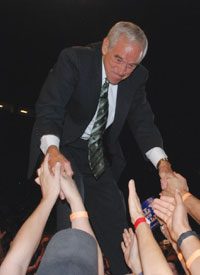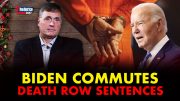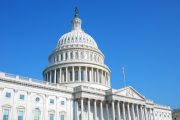
Texas Congressman Ron Paul lost his bid to be the Republican Party’s candidate for president in 2008, but you wouldn’t know it from the huge crowd that turned out at the Target Center in Minneapolis on Tuesday, September 2, for his Rally for the Republic. The program included a slate of speakers and musicians who kept the crowd enthused for nine hours. By the time Ron Paul spoke at 7:45 p.m., an estimated 12,000 people had packed into the arena to celebrate the culmination of his presidential campaign and the launch of the Campaign for Liberty.
Before the event got under way, Congressman Paul conducted a brief press conference in which he declared that the Rally for the Republic was being staged to celebrate the freedom movement and to satisfy the enthusiasm for its message. He also pointed out that it was being staged as a call to the Republican Party to return to its roots of limited government, personal responsibility, and protection of natural rights. Finally, the rally was also serving as the official kick-off for the Campaign for Liberty, an organization dedicated to defending and promoting the principles of individual liberty, constitutional government, sound money, free markets, and a non-interventionist foreign policy.
Paul then fielded a number of questions. One person asked where the country was headed. Paul responded that the country was headed for big trouble because all branches of government had lost sight of constitutional principles. Another questioner asked how Ron Paul’s movement might detract from support for Republicans. Paul retorted that the freedom movement was more likely to detract from Obama because young people like his freedom message. Perhaps the most important inquiry was, "Where do you go from here?" Paul stated that he was not trying to start a third party but, rather, he was trying to gain more influence through the Campaign for Liberty, by means of education, grass-roots lobbying, and other forms of political activity.
Tucker Carlson, MSNBC’s senior campaign correspondent, acted as master of ceremonies for the afternoon session. In opening the program, Carlson explained why he admired Ron Paul:
1. Congressman Paul is not interested in developing a cult of personality. He basically says, "I’m for freedom, adults disagree, and that’s okay."
2. He’s a nice guy and is kind to people around him.
3. Unlike most politicians, he has absolutely zero interest in controlling others.
The series of speakers criticized Republicans more than Democrats, which probably was a reflection of the frustration Ron Paul supporters feel over the cold shoulder Congressman Paul received from his own party during the primary campaign and during the national convention, which was taking place at the same time across the river in St. Paul. In order of appearance, the lineup included the following:
Howard Phillips: Phillips is the chairman of both the Conservative Caucus and the U.S. Taxpayers Alliance. He spoke on the importance of supporting such Ron Paul-sponsored legislation as that which would prevent illegal aliens from getting Social Security benefits, would get the United States out of the United Nations, and would abolish the Federal Reserve. He also encouraged listeners to contact the presidential debate moderators and encourage them to ask questions about the North American Union. He ended his talk with a quote from Thomas Jefferson to John Adams, which reflects the essential question that the Founders were trying to resolve, "whether man shall be allowed to govern himself or be ruled by a small elite."
Doug Wead: Wead is a presidential historian and New York Times bestselling author. Time magazine referred to him as the man who coined the phrase "compassionate conservative" in 1982. After a litany of jokes, he got serious and said that Ron Paul had spoken for him in the primary campaign debates, and concluded by reminding the audience that "America is the last refuge of liberty."
Thomas Woods: Dr. Woods is a senior fellow at the Ludwig von Mises Institute and author of the bestselling book The Politically Incorrect Guide to American History. He opened his remarks by referring to the GOP convention attendees as "those poor souls stuck at that snorefest down the street." The audience got another serving of "red meat" when Professor Woods described bipartisanship as the Stupid Party getting together with the Evil Party to do something both stupid and evil. He instructed the audience that the gold standard is the only fiscal system compatible with freedom and declared, "If you want to stop the war machine, you have to go after the money machine!"
Grover Norquist: Norquist is the president of Americans for Tax Reform and, surprisingly, a member of the Council on Foreign Relations. He stated that there are two fundamental political movements, one moving toward more freedom and the other toward more government. More government has to be funded by more taxes and Norquist warned the audience that Barack Obama’s plan to increase the capital gains tax would serve to plunder all forms of retirement accounts and pension programs.
Lew Rockwell: Rockwell is the founder and president of the Ludwig von Mises Institute and editor of Lewrockwell.com. There was lots of "red meat" in this speech, as he launched into an attack on President Bush, declaring that Bush "deceived people into voting for him" and "hasn’t done one decent thing for the country." He pointed out that Bush had campaigned on the promise of a "humble foreign policy" and described that phrase as "Orwellian," given what has actually transpired. He concluded by stating that William F. Buckley’s brand of conservatism, including militarism and right-wing collectivism, has been fulfilled during the Bush administration.
Bill Kauffman: Kauffman is an award-winning author of eight books. He may not be a household name, but Kauffman was well received, as he dished up healthy portions of "red meat" which the pumped up audience obviously savored. In another attack on Republicans, he described John McCain as "looking through the atlas for more countries to bomb." He portrayed Ron Paul as being "from 1776," while those running the GOP were "from 1984" (referring to Orwell’s book, not the Reagan administration!). He concluded by claiming that John Edwards was right when he said that there were two Americas, except that Kauffman described them as "the televised America, hated by the world, and the other America."
John McManus: McManus is the president of the John Birch Society, and was definitely the speaker who got in the most applause lines (other than Ron Paul himself, who spoke at least twice as long as everyone else). A bank of lights above the stage went on whenever a speaker delivered a line that was likely to fire up the audience, and illuminated the floor area of the arena, which served as a kind of mosh pit containing people enthusiastically waving "Rally for the Republic" signs. Those lights seemed to come on with almost every other statement that McManus made. His speech mixed humor with serious lessons on the U.S. Constitution taken from his widely distributed DVD, Overview of America. He also cited some of the numerous accomplishments of the John Birch Society, such as turning back the drive for a dangerous constitutional convention, and concluded by inviting everyone to the JBS 50th Anniversary Celebration, where Ron Paul will be the keynote speaker.
Bruce Fein: Fein is a legal expert with extensive national and international experience. Given his impressive credentials, it was not surprising that he gave the most intellectual address of the program. Far from losing his audience, however, he gave some great one-liners, such as, "Trying to bring democracy to Afghanistan makes as much sense as trying to get sunbeams from cucumbers!" He asserted that what Bush did in Iraq "is an impeachable constitutional offense." He concluded his remarks with a quote from Roman historian Tacitus, "The worst crimes were dared by few, willed by more, and tolerated by all."
Jesse Ventura: Ventura was governor of Minnesota for four years and is author of the recently released book Don’t Start the Revolution Without Me! Given his background as a professional wrestler, it was expected that "The Body" would be tossing out big slabs of "red meat" and he did not disappoint. His biggest applause line came when he declared, "The Second Amendment exists so that if our government gets out of control, we will be able to change it!" Being a 9/11 conspiracy buff, he asked, "Why isn’t Osama bin Laden credited for 9/11 on the FBI’s terrorist list?" With his book obviously in mind, he yelled, "I’m here; let’s get the revolution going!" and hinted that he might consider running for president in 2012.
John Tate: Tate is the executive director of the Campaign for Liberty (C4L). He narrated a video presentation expanding on what Ron Paul said during his press conference and on the ad that appeared in the Rally for the Republic magazine.
Gary Johnson: Johnson was a two-term Republican governor of New Mexico, a state that is two-to-one Democrat. He became nationally known for his fiscal conservatism, his support of a statewide voucher program, and his stand against the war on drugs. It wasn’t surprising, then, that he talked about the nation’s drug problem as the same kind of problem that we had with alcohol during Prohibition. He characterized it as a medical problem, not a criminal problem. He spent most of his talk describing some of the many bills he vetoed (750 altogether), singling them out as classic examples of the waste of taxpayer money.
After the early-evening break, Barry Goldwater, Jr. stepped forward to give some introductory remarks, reminding the audience that the GOP had made a Contract with America back in 1994, and then spent the next 12 years becoming everything that it had campaigned against. Finally, the moment that everyone had been waiting for arrived, and Ron Paul made an entrance resembling that of a national convention, complete with signs, balloons, and cascades of confetti.
After the thunderous, rock-star reception, Congressman Paul spent a full hour forcefully delivering his message of freedom. He recalled his roots as a country doctor and his reluctance to enter into a life of politics. "I lost my skepticism," he said. "I hope you lost your apathy." The fired up crowd made it clear that they had.
Congressman Paul also recalled many of the challenges of his presidential campaign, including exclusion from some debates and dismissive media coverage. But he also touched on some of the successes, such as the popularity of his message among young voters, despite his being one of the eldest candidates in the race. Paul then launched into a recital of many of the themes of his campaign: opposition to the war in Iraq, withdrawal of the United States from the United Nations, ending federal income taxes, removing our military from foreign soil, and abolishing fiat money, to name a few. In fact, the most popular chant that the audience launched into throughout the day was, "End the Fed!"
The crowd obviously loved what they heard, and ultimately went off into the night recharged, with the hope that Ron Paul’s campaign was not ending, but entering a new phase. "I firmly believe that our day is coming," Congressman Paul had assured the crowd, "Ideas spread; you can’t stop them."
Media coverage of the Rally for the Republic varied from favorable to misleading. The local newspaper here in Appleton, Wisconsin, had a nice write-up on it the day before the event, but nothing afterwards. The Minneapolis and St. Paul newspapers buried their stories among the blanket coverage they gave to the GOP convention, and then gave more ink to Jesse Ventura than they did to Ron Paul. Early Associated Press reports put attendance at the rally in the hundreds. That may have been true in the first hour, but attendance quickly reached into the many thousands as the afternoon went on. The most deceptive reporting was that of the Washington Post, which was notorious for its news blackout of Ron Paul during the primary campaign. It posted video highlights of the rally on its website, first showing people working their way through the lobby, then showing the floor of the arena during the time that Ron Paul conducted his press conference, before the public was let in. This cunning switch in chronology served to give the misleading impression that the rally was not well attended when, in fact, it was virtually sold out. It’s another example of why the mainstream media can’t be trusted to give the American public the unvarnished truth, and why more people need to read The New American.



